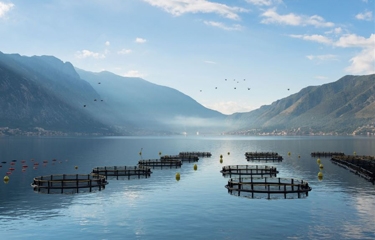The Global Salmon Initiative has published its annual sustainability report and launched a resource hub designed to offer data and materials to document the impact the organization is having upon the industry.
GSI was created in 2013 as a collaborative effort by many of the world’s largest farmed salmon producers to push for collective efforts on sustainability initiatives. The group, which now includes 13 companies comprising 40 percent of the world’s total salmon production, has established goals including minimizing its environmental footprint and continuing to improve its social contributions.
The report, which collates eight years of data across 10 environmental and four social indicators, indicates its members have achieved a 60 percent reduction in their average use of antibiotics since 2013; A 40 percent decrease over that timeframe in the use of marine ingredients in the fishmeal it consumes and an 11 percent decrease in the marine ingredients it consumes for fish oil; An increase in the use of alternative feeds and a use of more processing byproducts; A 50 percent reduction in the use of medicinal treatments to treat sea lice; And a nearly full-scale shift to using non-medicinal management practices rather than in-feed treatments.
“Since its formation in 2013, GSI members have targeted their efforts on accelerating progress against the most significant environmental challenges facing the sector: biosecurity and sustainable feed sourcing, as well as motivating industry progress towards third-party certification,” GSI said in a press release. “As the report highlights, these are the areas showing the most progress. It also demonstrates that the group’s platform of focusing and coordinating environmental improvement efforts is yielding measurable progress on a global scale.”
GSI member companies including Australis Seafoods S.A.; Bakkafrost; Blumar; Cermaq; Salmones Camanchaca SA; Empresas AquaChile; Grieg Seafood ASA; Multiexport Foods S.A.; New Zealand King Salmon; Nova Sea AS; Salmones Austral; Tassal; and Ventisqueros. GSI companies have a presence in Australia, Canada, Chile, the Faroe Islands, New Zealand, Norway, and the U.K., according to the organization.
Bakkafrost CEO and GSI Co-Chair Regin Jacobsen said the report offers insight into how the global salmon industry is pushing for positive change and improvement.
“Sustainability reporting is part of normal business operations these days, but the GSI report is unique in that it provides data industry-wide and year on year all in one place. What started out as a means of making each of us members accountable has become a key tool in helping us identify where we need to make greater progress, and then challenging the GSI platform to find solutions and implement them – with the end goal of ensuring a more sustainable industry and a more responsible product for consumers,” Jacobsen said. “Each year, we assess both our GSI goals and the Sustainability Report to see how we can evolve and strengthen them to drive further environmental progress. As we are embarking on our new work with World Wildlife Fund on climate impact and mitigation, we are hopeful that soon we will be able to add more carbon specific measures to the report to cement the sector’s role as a leading provider of eco-efficient and climate-friendly protein.”
AquaChile CEO and GSI Co-Chair Sady Delgado, who recently reassumed the role of GSI co-chair after previously serving in the role five years ago, said GSI ensures the industry is achieving its sustainability and environmental goals.
“As an industry, we continue to face challenges, and no doubt will face more in the years to come. I believe the platform GSI provides will be crucial in helping us move forward, and we can only move forward when the facts are laid on the table,” Delgado said. “For this reason, the Sustainability Report remains as crucial to our progress as it did in year one.”
GSI’s success has been driven by four key elements applicable across other sectors: greater transparency, global action, supply chain engagement, and local capacity to implement, according to GSI CEO Sophie Ryan.
“The question we have to ask ourselves today is how we can develop a food system that provides the amount of healthy food we need while not destroying our planet. Salmon farming alone will not be the answer, but done right, it is definitely part of the solution. Our job within GSI now is to get it right,” Ryan said. “With the commitments of the members, we have created a framework to drive the necessary improvements industry-wide at speed and scale – and this report shows us where and how. The findings are not just for our stakeholders, but for our own members as we hold each other accountable and identify where we collectively need to work harder.”
Ongoing initiatives in which GSI has taken a leading role include a collaboration with the World Wildlife Fund (WWF) to develop an industry-wide reporting framework to measure greenhouse gas emissions for the aquaculture sector and identify ways to mitigate climate impact, and participation in the United Nations Food Systems Summit, including recently co-hosting a Food Systems Summit Dialogue.
“GSI is helping to identify and activate game-changing solutions for food systems transformation. In doing so, it seeks to demonstrate the essential role blue foods play in current and future food systems that are inclusive, healthy, sustainable, and resilient,” GSI said.
Photo courtesy of the Global Salmon Initiative







